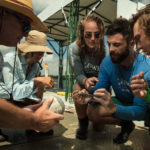Health care + information technology = medical informatics
For educators and staff of the University of West Florida’s online certificate of medical informatics program, job No. 1 is often defining the relatively new and fast-growing field.
As defined in the UWF ebook, “Medical Informatics: Practical Guide for the Healthcare Professional,” medical informatics is “the application of computers, communication and information technology and systems to all fields of medicine – medical care, medical education and medical research.” Some job possibilities include researcher, educator, manager, systems analyst, software developer, clinical analyst, medical informaticist, IT liaison, implementation specialist or IT product marketer.
Computerization of health care in general, and talk of computerizing the nation’s medical records in particular, no doubt will have health-care organizations leaning heavier on medical informatics expertise in the years ahead. Last year, the Healthcare Information and Management Systems Society’s annual conference attracted more than 27,000 attendees interested in various areas impacted by medical informatics. Next month, similar attendance is expected in Atlanta and university representatives will be on hand to tout UWF programs, himssconference.org. Monster.com also will be sponsoring a special session on career development in this growing field.
UWF, which started its medical informatics program in 2002, now offers a four-course graduate or undergraduate certificate in medical informatics. Strong candidates are students with a keen interest in either health care or information technology and the courses are designed to prepare students for the type of challenges they will face their first few years on the job. But since the field is growing rapidly, on-the-job training or continued education courses will be an obvious need to supplement particular needs on particular jobs.
Keeping the UWF curriculum up-to-date is a primary goal. “Outreach efforts and speaking engagements help the faculty ensure that the curriculum is valid,” said Melanie Sutton, who was appointed co-director in 2002 after working with Sacred Heart Hospital radiologists to develop computer algorithms to assist in the detection of breast cancer.
Robert Hoyt, the program’s other co-director, is also physician champion for medical informatics at Naval Hospital in Pensacola as well as a frequent speaker and lecturer on medical informatics. His online continuing education mini-courses have been introduced to working professionals throughout Florida by Stephanie Reedy, the UWF program’s academic advisor and outreach coordinator. She also facilitates continuing education workshops covering computer applications in health care while talking directly with professionals in the field from Pensacola to Destin.
“Stephanie’s role with us emphasizes the grassroots effort needed to train the working professionals with degrees to bring them up to speed with the direction IT is going in health care,” Sutton said.
With a generous donation from Hoyt and his wife, Ann Yoshihashi, another key player with the certificate program, the university created the Alliance for Medical Informatics as a way to involve regional technology firms, educators and health-care organizations in identifying workplace competencies for the UWF curricula and to enhance future employment opportunities for UWF graduates.
Another component of the medical informatics outreach effort involves educating the educators. Because of the need nationwide for community college instructors to acquire the necessary competencies in order to launch programs in their own regions, Sutton said UWF launched an 18-hour, online Advance Graduate Certificate in Medical Informatics Teaching and Integration.
A “learn-at-lunch” training program and Web site targeting high school counselors, funded by Florida’s Great Northwest, and the Education Pathways Web site, uwf.edu/sahls/school, serving high school students and their parents all help introduce the opportunities the medical informatics field has to offer.
Florida’s Great Northwest also recently funded both full and partial scholarship for students pursuing an accelerated Certificate in Medical Informatics as part of a new graduate online executive software engineering degree. A scholarship from ITGULFCOAST, an organization of information technology professionals, to an undergraduate starting in this field also recently was awarded to help bring attention to this emerging field and to highlight the value the region places on this growth area.
For more information about the UWF medical informatics program, visit uwf.edu/sahls/certificate-informatics or e-mail medicalinformatics@uwf.edu.
More information
Healthcare Information and Management Systems Society’s Atlanta conference, himssconference.org
UWF Alliance for Medical Informatics, uwf.edu/sahls/alliance
ITGULFCOAST, a nonprofit organization for information technology professionals in the Gulf Coast area, itgulfcoast.org
Biomedical informatics information, biohealthmatics.com
Healthcare Information and Management Systems Society job information, jobmine.himss.org
American Medical Informatics Association, amia.org/content/amia-job-exchange
By Susie Forrester, University Marketing Communications


